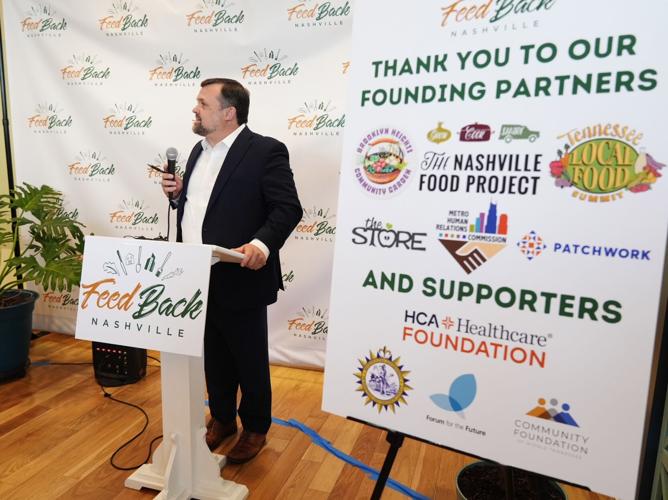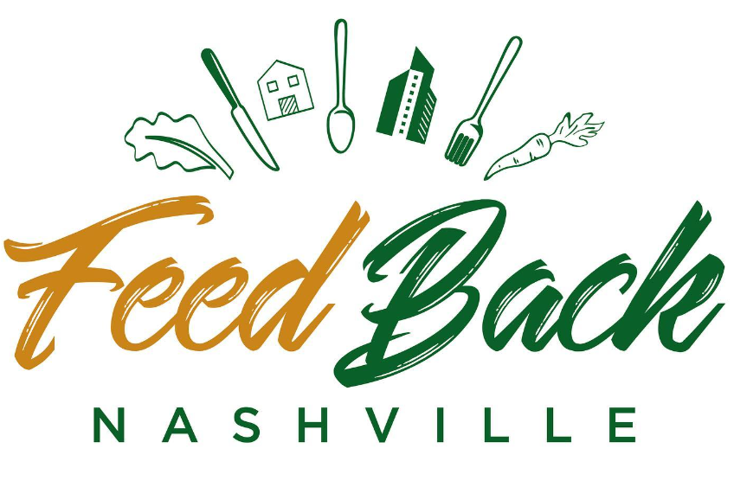
At a press conference Tuesday at The Nashville Food Project, a large group of community leaders gathered in front of a crowd of food security advocates and local politicians to unveil a two-year initiative called FeedBack Nashville. The new group was founded by members of several local organizations invested in the food future of Nashville, including The Nashville Food Project, Brooklyn Heights Community Garden, Metro Human Relations Commission, Nashville Community Gardens Coalition, Patchwork, Porter Road Grocery, Tennessee Local Food and The Store.
The genesis of FeedBack Nashville goes back to when members of some of these groups met in an effort to bring the cause of local food insecurity into the discussion as candidates ran in this year’s mayoral and Metro Council elections. While discussing what issues mattered to them, the collection of leaders realized how interconnected the causes and effects of the breakdown of the food system in Nashville were, and sought a way to address them, as TNFP CEO C.J. Sentell said at the press conference, “from field to plate to landfill ... every step that food takes from farm to fork, seed to trash.”
The statistics are startling — 12.4 percent of Nashville residents don’t have reliable access to food, including 1 in 5 children living in the city. Sentell stressed it doesn’t have to be this way, saying: “There is already enough food in Nashville. Abundance is a fact! It’s a question of imagination and determination as to whether we face this fact.”
Farming takes up more than 40 percent of Tennessee’s 26.4 million acres. But Metro director of sustainability and innovation Kendra Abkowitz revealed that an estimated 40 percent of the U.S. food supply goes uneaten, representing a $444 billion loss to the economy. She also shared that 22.9 percent of Nashville’s landfill waste is organic matter. Even more harrowing, the landfills that service Nashville will probably be “landfulls” within three to five years.

C.J. Sentell, CEO of The Nashville Food Project, speaks at the launch of Feedback Nashville, Dec. 5, 2023
There are systemic breakdowns happening all through the food chain, and FeedBack Nashville pledges to identify both the weaknesses and opportunities within that chain over the next two years. Taking a holistic approach to the food system is critical. “We were looking at issues in isolation,” explained Sentell. “Instead we needed to be engaging the communities most affected by these situations to devise practical solutions. The boundaries within the food system are wide and permeable. Food deserts are also issues of housing and transportation, symptoms of a larger broken system.”
Adding a fourth vertex to Mayor Freddie O’Connell’s triangle of critical Nashville issues, Sentell pointed out: “How Nashville eats affects and is affected by how Nashville moves, works and grows, and many of these issues are perpetuated through discrimination. Nashville cannot be a world-class city without a world-class food system.”
Initial funding for FeedBack Nashville was provided by Metro Nashville’s COVID-19 Financial Oversight Committee and the HCA Healthcare Foundation with the Community Foundation of Middle Tennessee serving as the fiscal sponsor for the initiative. A steering committee of 16 community members represents different areas of expertise and interest, ranging from urban gardens, housing solutions and regional development to sustainable agriculture and landfill practices.
They recognize that they are taking on a very difficult task with an aggressive timeline, but they would not have coalesced into a group without the belief that progress could be made. Primary objectives for FeedBack Nashville over the next 24 months include a systemic diagnosis of the current food system in Middle Tennessee, with emphasis on factors that affect food and land access, food waste and agricultural production, developing a community-based vision for a more just future of the food system, and identifying short-term and long-term pathways toward a more sustainable food future for the city.
Along the way, they hope to achieve secondary goals like building a network of community leaders to help enact system changes in their own communities and encouraging residents to see the food system as interrelated, not subject to fragmented ad hoc fixes. They also plan to look for long-term funding to sustain these efforts on the way to a more stable and equitable food system.
Hanes Motsinger, chief program officer at The Nashville Food Project, closed the official announcement with a few requests from the community. First, engage with FeedBack Nashville by signing up for their newsletter and/or following them on Facebook or Instagram. Those will be the best places to find out about opportunities to interact with the steering committee and your neighbors at a planned series of community potlucks, dinners and conversations. Or if you have your own ideas about what can be changed or how to improve existing systems, they welcome your input via email at info@feedbacknashville.org. Finally, Motsinger and the rest of the steering community ask you to believe in the possibility of this work, that we can really effect change in ways that will make Nashville a better place to live, work, grow and eat.
For years, many of these dedicated groups have been rowing in the same direction toward improving the food system of Nashville. With the advent of FeedBack Nashville, it’s great to see them all in the same boat.






